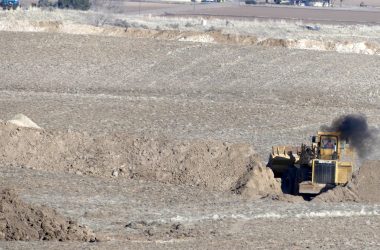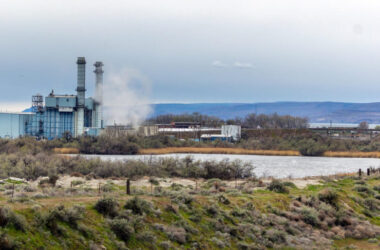NYSSA – Malheur County officials are taking over the job of getting more money from the state for the Treasure Valley Reload Center – and they are not being bashful.
The Malheur County Court is expected to formally ask the Legislature for $8.5 million more to finish the reload center as designed.
That’s a major departure from the approach of the public company it set up five years ago to handle the project.
In the past year, the Malheur County Development Corp. has zigged and zagged at its financial troubles deepened. To save costs, it decided to scale back the warehouse, never making clear whether the shipping depot could still operate with the changes. To find more money, its project manager, who is an expert in finance, scouted sources of money that proved unavailable.
“It’s a project that needs to get finished. I’m not saying that it’s a project that hasn’t had its hiccups.”
–State Rep. Mark Owens
Malheur County officials, led by Commissioner Ron Jacobs, have decided to take a leading role to see the project is finally done, asking legislators for a fourth helping of state money.
And they intend to ask for about $2 million more than their development company had settled on.
They want money to fully equip the building to handle various commodities instead of the thinned-down version that the public company had settled on for onions alone. They are seeking money to pave streets needed for trucking rather than leaving them as gravel or undone entirely.
Jacobs declined an interview because of what he termed negative reporting by the Enterprise, and he also said county officials have been advised by an attorney not to answer questions about the reload project while the newspaper’s lawsuit over access to public records is pending.
Grant Kitamura, the onion company executive who is president of the development company, didn’t respond to written questions sent by email last week.
The shift comes after the development company struggled to progress. Its project manager, Greg Smith, quit with little notice in February. He has been the primary conduit to the Legislature, where he also serves as a powerful state representative.
Smith led discussions with Union Pacific Railroad, which will serve the Nyssa project, and Americold, the Georgia company under contract to run the reload center.
Going to the Legislature carries risks. There is no assurance the county’s request will be approved. And even with approval, the money could flow long after this year’s prime construction season.
That leaves the county and development company facing the prospect of costly borrowing in the meantime to keep going, a plan Smith advanced in February. Such a borrowing could turn into another drain on county resources if legislators don’t approve new funding, leaving project leaders to pay back the loan from local resources. The most likely source: the county treasury.
The pursuit of more state money comes as the county and the development company press to get construction re-started.
Contractors left the site north of Nyssa in December as money ran out and commitments for new funding got delayed.
But the development company can expect the equivalent of two checks soon.
The Oregon Department of Transportation is expected to complete a revised funding agreement that would free up $3 million. That money is earmarked for one task – erecting the shell of the warehouse building. Project leaders already bought and paid for the steel kit that will result in the building. The pieces have been sitting on the ground in Nyssa since August.
The development company has struck a deal with Nelson Construction of Walla Walla, Wash., to put up the building frame on a concrete foundation.
“They are eager to proceed and ready to start immediately,” said Brad Baird, project engineer with Anderson Perry & Associates.
And work on a fourth rail spur can advance as soon as county officials sign off on a new $2 million funding deal.
But the Malheur County Court recently held off approval, requiring that project engineers first prove that soil at the former cropland is suitable for track work. The project ran into trouble last year when soil intended for use in building other rail spurs proved unsuitable, requiring the costly trucking of replacement material.
But the new state funding is the key. Without it, the building can’t be equipped, $1.2 million owed to contractors for work already done can’t be paid, and there would be no money for basics such as electricity and sewer.
Any new state funding for the Malheur County project would have to pass through the Joint Ways and Means Committee, which sets the state budget. Smith is a leader on that committee. State Sen. Lynn Findley, the Vale Republican, also sits on the committee.
Normally, money for projects such as the Treasure Valley Reload Center goes into a single piece of legislation. That legislation usually doesn’t advance until the final month of the session, scheduled for June.
That presents two challenges for Malheur County and project officials.
Unless an unusual legislative commitment is made earlier, officials won’t know until this summer if the $8.5 million is coming. And then there is the timing.
Even if legislators approve the extra money, months could pass before project managers would see it.
Findley and state Rep. Mark Owens, R-Crane, recently committed to supporting such a request, which is likely to face close legislative scrutiny.
Last September, Findley assured colleagues that the $3 million he was asking for was enough to finish the reload center. Findley, who at the time served on the board of the development company, had been provided reports showing otherwise. He has since insisted that he was misled by project leaders.
In late February, Findley told the Enterprise in an email that he had urged county officials to request the extra funding through the standard legislative channels. For the time being, he said, he would not himself seek more state funding.
In a virtual town hall last week, Findley and Owens both lined up behind the county’s request.
“It’s a project that needs to get finished,” Owens said. “I’m not saying that it’s a project that hasn’t had its hiccups. From digging up onion beds to extra gravel to inflation costs. It’s something that we need to get a handle on and we need it finished.”
He said he and Findley would put on a “full-court press” once the county formally requests the funding.
Findley noted that a “pivot” had occurred on the project.
“The county is taking a much more active role,” he said. “I believe they’re going to find new management.”
He said that with the shift to the county, new management and seeing that “transparency is established,” he would look forward to moving the project forward.
Jacobs now believes the onion industry should put in money as well.
“Nothing talks better than money, so I would like to see some contribution there,” the Argus Observer quoted Jacobs as saying.
Owens said he wasn’t convinced the onion industry should put money in, according to the newspaper.
The development company recently released records to the Enterprise in response to several public records requests. Among disclosures in the records:
• The development company as of Feb. 10 was past due on $367,000 in bills. Smith had often assured the board that all bills were being timely paid. Kitamura and other company officials didn’t respond to questions about the status of those bills.
• The development company had no contract with Smith’s company despite paying $9,000 a month for his services since last August. That may violate state contracting requirements.
• The development company has no records to back up several of the figures in a Feb. 8 “budget analysis.” The company, for instance, said “no records exist” to document what elements it cut from the warehouse building to save $2 million. The company said “no records exist” to document what is listed on the budget document as a $1.2 million “overage.”
The records also provide a glimpse into another possible hurdle to opening the reload center.
The budget analysis projected the center running by Sept. 30 “if Americold is ready.”
That caught the attention of state transportation officials, who asked Smith for information.
Smith responded in a Feb. 10 email that was obtained by the Enterprise through a public records request.
“We can estimate that it will take approximately a month for them to move in and begin operations, but with employment struggles and possible equipment shortages, we wanted to add the caveat that they may start at a later date,” Smith wrote.
He didn’t say what that later date would be.
Americold officials didn’t respond to written questions about the matter.
Reporter Steven Mitchell contributed to this story.
Contact Editor Les Zaitz: [email protected].
PREVIOUS COVERAGE:
YOUR GUIDE: What is the Treasure Valley Reload Center?
Request to state for help grows as Smith walks away from Nyssa rail project
Short of money, rail managers ask contractors to hold onto bills for work already done
SPECIAL REPORT: Another state bailout for Nyssa rail project in the works
SPECIAL REPORT: Smith pledges scrutiny of rail project budget, can’t produce one
SPECIAL REPORT: State suspends payments for Nyssa rail project
State’s fund for rail center nearly exhausted but millions in costs remain, records show
HOW TO SUBSCRIBE – The Malheur Enterprise delivers quality local journalism – fair and accurate. You can read it any hour, any day with a digital subscription. Read it on your phone, your Tablet, your home computer. Click subscribe – $7.50 a month.




